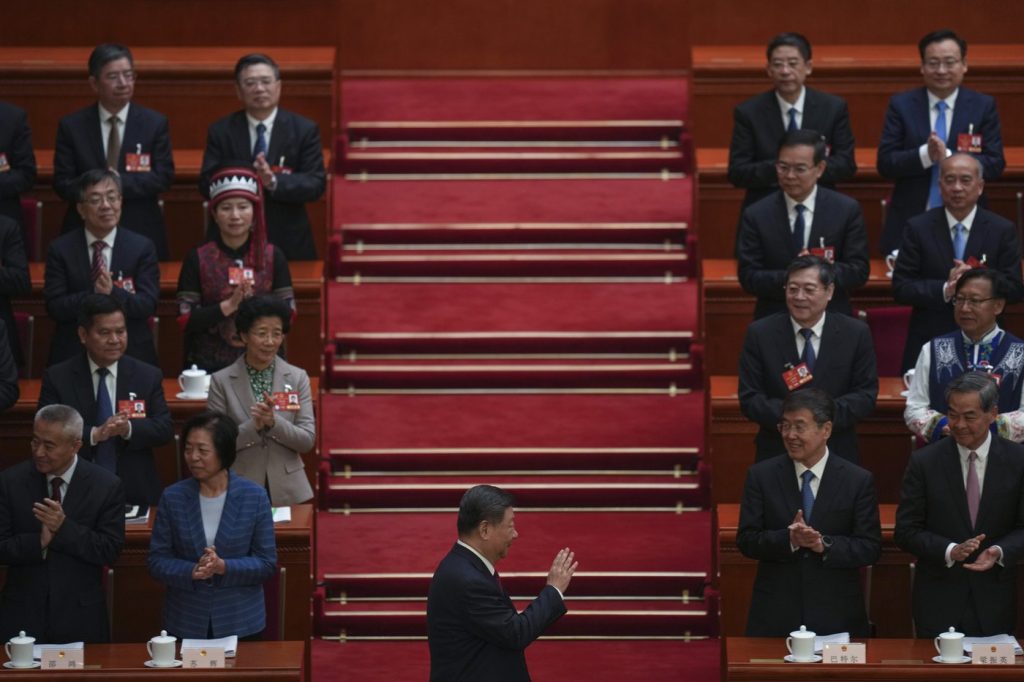BEIJING (AP) – On Wednesday, March 5, 2025, China inaugurated its annual parliamentary session, the National People's Congress (NPC), where the government’s priorities for the year were outlined. The session opened with a work report delivered by Premier Li Qiang, emphasizing the need to stabilize the sluggish economy and promote broader applications of artificial intelligence (AI).
Beijing committed to addressing several pressing economic challenges, including a downturn in the property market and escalating government debt. These issues are significantly hampering economic growth. Additionally, the government aims to increase employment opportunities and enhance public education, healthcare, and social security support for its citizens.
One of the key targets set by China for economic growth in 2025 is "around 5%," maintaining the goal established in the previous two years. In 2024, the economy achieved a growth rate of 5%, aided by strong exports and stimulus initiatives. However, the International Monetary Fund (IMF) has projected a decline in growth for the current year to approximately 4.6%. The looming prospect of a trade war with the United States poses a significant threat to this growth target, as both nations have recently engaged in mutual tariff impositions. These tariffs could potentially reduce China's economic growth by as much as 1.1 percentage points this year, according to forecasts from Maybank Investment Banking Group.
In his address, Premier Li emphasized that increasing domestic consumption must be the government’s foremost priority. He mentioned that there has been a persistent lack of domestic demand, particularly in consumption. The government's goal is to make domestic demand the primary engine driving economic growth. The reluctance of Chinese citizens to spend has contributed to a deflationary phase, exacerbating the economic challenges facing the country.
In response to these issues, the government has outlined several measures designed to stimulate consumption. Among them is an increase in the fiscal deficit ratio from 3% to 4%, as well as the issuance of ultra-long special treasury bonds amounting to 300 billion yuan (approximately $41.3 billion) to finance trade-in programs for consumer goods, which are already in progress.
The pursuit of technological self-reliance, particularly in AI and other advanced technologies, continues to be a critical objective for China, championed by President Xi Jinping. Following U.S. restrictions on Chinese access to essential technologies, particularly semiconductors, Beijing is keen on developing these advanced technologies domestically. Premier Li assured that the government would bolster research and development in key technological fields, focusing on enhancing AI applications in smart manufacturing, new-energy vehicles, and robotics.
China also aims to address its real estate market woes and local government debt. This downturn in the property sector was spurred by the government's crackdown on excessive borrowing by real estate developers, leading to significant defaults among property companies. Premier Li affirmed that the government would persist in efforts to stabilize the real estate market, including lifting restrictions on property transactions and facilitating real estate financing to ensure timely project completions. Furthermore, the central government's commitment extends to tackling the rising local government debt and targeting the hidden debts of local authorities.
Moreover, the government announced a 7.2% increase in its defense budget for the year, mirroring last year’s growth rate. As the entity with the largest armed forces worldwide and the second-largest military budget after the United States, China continues to assert its territorial claims and challenge U.S. alliances throughout Asia. The work report reiterated Beijing's ambitions regarding Taiwan, emphasizing the government's goal to "resolve the Taiwan question," which implies a desire to annex the self-governing democracy.
In summary, the National People's Congress has outlined several economic strategies aimed at stimulating growth and addressing pivotal challenges such as consumption deficits, technological advancement, property market instability, and local government debt, all set against a backdrop of rising external pressures and defense commitments.










